
Dogs have long been celebrated as humanity’s most loyal and affectionate companions. Yet beyond their role as beloved family members, professionally trained therapy dogs can play a transformative role in mental health support, offering comfort and assistance to those in need. The Rise Wise Foundation, a non-profit organisation in Hong Kong, has introduced an innovative programme titled “Animal Assisted Art and Music Therapy for Underprivileged Special Educational Needs (SEN) Youth”. This initiative integrates the therapeutic benefits of art, music and trained therapy dogs to promote emotional well-being and psychological growth in young people facing challenges.
With the support of Link Together Initiatives, Rise Wise Foundation continues to conduct therapeutic workshops in 2024/25. Employing internationally validated techniques, these workshops provide participants with a safe and relaxed environment where they could release academic and familial stress. The sessions aim to alleviate anxiety and depression while fostering self-confidence as well as emotional and mental well-being.
The University of Denver explains that today’s youth face a variety of mental health challenges, including academic pressure, family circumstances, and social isolation.
Anthea Yung Hamnett, founder of Rise Wise Foundation, holds a master’s degree in psychology from the University of Sydney and assisted intervention specialist from University of Denver.
“Today’s youth face a variety of mental health challenges, including academic pressure, family circumstances, and social isolation. These developmental hurdles can easily lead to anxiety, depression and other behavioural issues. For SEN youth, difficulties in expressing and managing emotions often make it harder for them to integrate into mainstream social environments, undermining their self-confidence and heightening feelings of loneliness,” she explains.
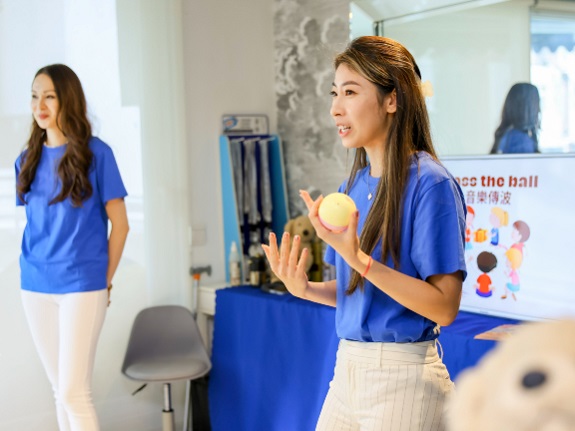
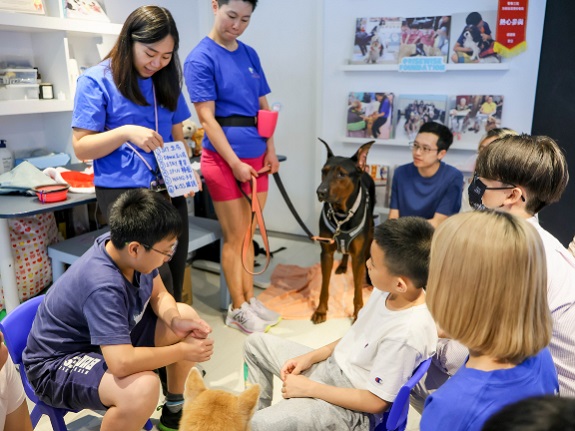
“What sets our project apart from other emotional wellness programmes is our use of trained dogs as a primary therapeutic tool. Our certified therapy dogs are intuitive to SEN children’s emotions, and they are trained to motivate and facilitate participants learning and engagement to learn social emotional skills.” she adds.
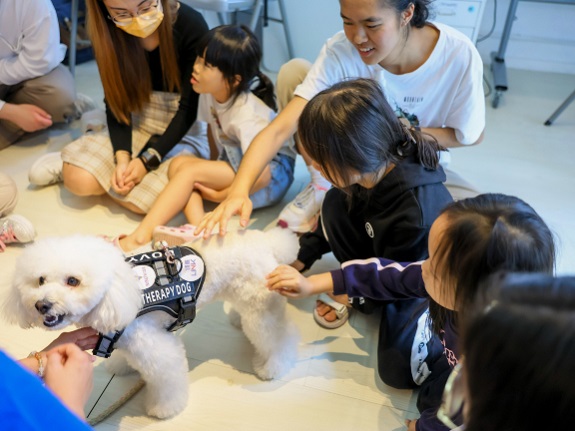
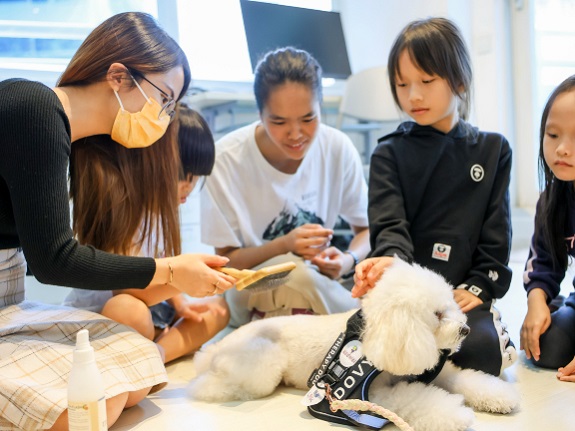
Anthea emphasises that only dogs meeting specific qualifications can become professional therapy animals. “The dogs must exhibit a friendly temperament, remain calm and feel comfortable around people,” she explains. “During the six-to-nine-month training period, we teach them to stay composed in the presence of sudden loud noises or abrupt movements. They must pass stringent assessments to qualify as therapy dogs.”
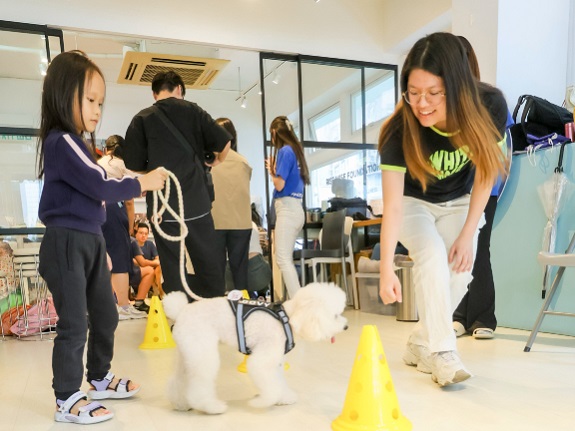
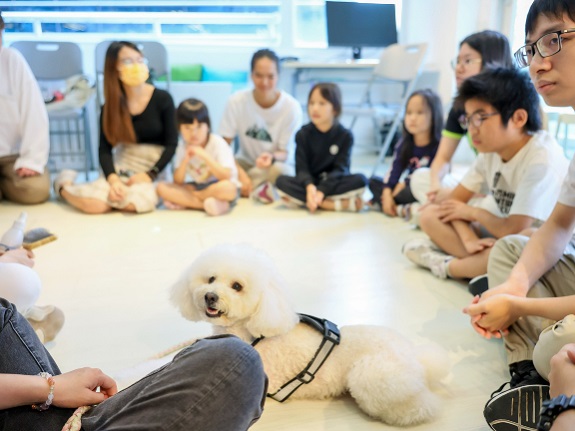
To foster a soothing environment conducive to emotional relief, volunteers complement the dogs’ interactions with SEN youth by playing mindfulness and calming music.
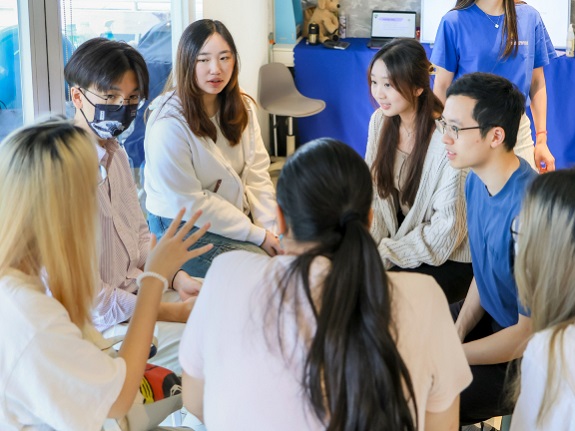
Link Scholars Alumni, a group comprising recipients of the Link University Scholarship, formed its inaugural committee this year and organised two volunteer initiatives. Among these was a collaboration with Rise Wise Foundation, enabling Link scholars to assist animal-assisted therapists in their work with SEN children.
Winky Shek, a student at the University of Hong Kong (HKU), served as a group leader, overseeing theme planning for the initiative. “The participating university students share a passion for animals and a concern for animal welfare. They were eager to learn about animal-assisted therapy while helping children relax and release stress through these activities,” she explains.
A psychology major, Winky aspires to work in mental health education after graduating. “This experience introduced me to a fascinating and unique therapeutic approach. It was inspiring to observe how dogs can effectively fulfil therapeutic roles.”

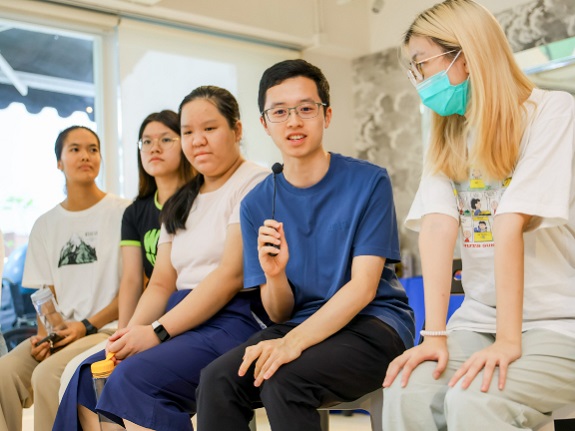
Another participant from HKU, Adrian So, expressed a different kind of satisfaction from his involvement: “SEN children require more care and attention than their peers, and I felt privileged that they were willing to interact and share with me.” Adrian, a medical student, adds, “After graduation, I hope to use my medical training to support the elderly and individuals with mental and physical challenges. I believe animal-assisted therapy holds significant potential for these groups as well.”
What sets this collaboration with Link Scholars Alumni apart from Rise Wise Foundation’s previous SEN workshop partnerships?
Anthea highlights that the university student volunteers from Link bring relevant academic backgrounds and professional expertise in fields such as psychology and education, infusing the workshop with fresh perspectives and youthful energy. “As young people, they can more easily relate to SEN youth, building trust and fostering a sense of security through empathy. This collaboration also provided Link Scholars with a deeper understanding of the challenges faced by the SEN community, enhancing their social responsibility. It was truly a win-win partnership.”